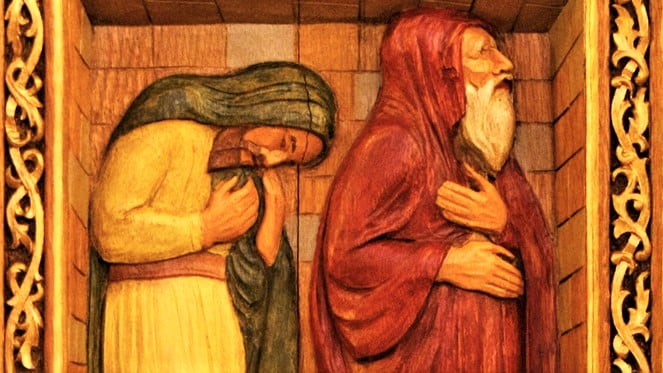WEDNESDAY IN THE 3RD WEEK OF LENT READINGS AND COMMENTARY:
“I HAVE COME NOT TO ABOLISH THE LAW BUT TO FULFILL IT”
(Mt 5:17–19).
“I HAVE COME NOT TO ABOLISH THE LAW BUT TO FULFILL IT”
(Mt 5:17–19).

Wednesday in the 3rd week of Lent
Mass readings
READING I
Dt 4:1, 5–9
Moses spoke to the people and said: “Now, Israel, hear the statutes and decrees which I am teaching you to observe, that you may live, and may enter in and take possession of the land which the Lord, the God of your fathers, is giving you. Therefore, I teach you the statutes and decrees as the Lord, my God, has commanded me, that you may observe them in the land you are entering to occupy. Observe them carefully, for thus will you give evidence of your wisdom and intelligence to the nations, who will hear of all these statutes and say, ‘This great nation is truly a wise and intelligent people.’ For what great nation is there that has gods so close to it as the Lord, our God, is to us whenever we call upon him? Or what great nation has statutes and decrees that are as just as this whole law which I am setting before you today?
“However, take care and be earnestly on your guard not to forget the things which your own eyes have seen, nor let them slip from your memory as long as you live, but teach them to your children and to your children’s children.’
RESPONSORIAL PSALM
R. Praise the Lord, Jerusalem.
Glorify the Lord, O Jerusalem;
praise your God, O Zion.
For he has strengthened the bars of your gates;
he has blessed your children within you.
R. Praise the Lord, Jerusalem.
He sends forth his command to the earth;
swiftly runs his word!
He spreads snow like wool;
frost he strews like ashes.
R. Praise the Lord, Jerusalem.
He has proclaimed his word to Jacob,
his statutes and his ordinances to Israel.
He has not done thus for any other nation;
his ordinances he has not made known to them.
R. Praise the Lord, Jerusalem.
VERSE BEFORE THE GOSPEL
Your words, Lord, are spirit and life; you have the message of eternal life.
GOSPEL
Mt 5:17–19

Gospel Commentary from the Navarre Bible, St. Matthew (with permission)
- vv. 17-19 In this passage Jesus stresses the perennial value of the Old Testament; it is the word of God; because it has a divine authority it deserves total respect. The Old Law enjoined precepts of a moral, legal and liturgical type.
- Its moral precepts still hold good in the New Testament, because they are for the most part specific, divine-positive, promulgations of the natural law. However, our Lord gives them greater weight and meaning.
- But the legal and liturgical precepts of the Old Law were laid down by God for a specific stage in salvation history, that is, up to the coming of Christ; Christians are not obliged to observe them (cf. Summa theologiae, I-Il, q. 108, a. 3 ad 3).
- The law promulgated through Moses and explained by the prophets was God’s gift to his people, a kind of anticipation of the definitive Law which the Christ or Messiah would lay down. Thus, as the Council of Trent defined, Jesus not only “was given to men as a redeemer in whom they are to trust, but also as a lawgiver whom they are to obey” (De iustificatione, can. 21).
Dear brethren in Christ, Our Lord assured that whoever keeps the commandments and teaches them will be great in the Kingdom of heaven. Now is a suitable time to examine our entire life, a review of life in the fulfillment of God’s commands. Christ came to vivify the law and to perfect it. He was a model in the fulfillment of the divine will.
- As Saint Bernard says:
- “And since life is in the will of God, we cannot doubt in the least that we will find nothing that is more useful and profitable to us than that which agrees with the divine will which is the life of our soul. Let us try with care not to deviate in the least of God’s will (Sermon 5).”
- Lord, you have said: let not my will be done, but yours, (Mk 14:36; cf. Mt 26, 33-46; Lk 22, 40-46). And as Saint Leo the Great comments: “This voice of the Head is the salvation of the whole Body; this voice teaches all the faithful, kindles the confessors, crowns the martyrs (Sermon 58).” May thy Most Holy Will be done, praised and glorified!
Stay safe and God bless! Fr. Rolly Arjonillo
VIDEO COMMENTARY
TOPIC: DO YOU RESPECT TRADITION WHILE ADAPTING TO CHANGE?
In today’s liturgical readings, tradition and change go side by side as an essential element of our life. In the first reading, Moses tells the Israelites to respect their laws and customs because they come from God. Obeying the laws will please God. In the gospel reading, Jesus emphasizes that He has not come to abolish the Law but to uphold it and complete it. Remember that He is a Jew and His audience are mainly Jews. From the time Moses introduced the Ten Commandments, the scribes have inserted many laws that have clouded the spirit of the law and put more emphasis on the letter.
Stay updated: subscribe by email for free TO OUR NEW WEBSITE www.catholicsstrivingforholiness.org (PUT YOUR EMAIL IN THE SUBSCRIBE WIDGET).
We are also in www.fb.com/Catholicsstrivingforholiness. Kindly help more people in their Christian life by liking our page and inviting your family, friends and relatives to do so as well. Thanks in advance and God bless you and your loved ones! Fr. Rolly Arjonillo

